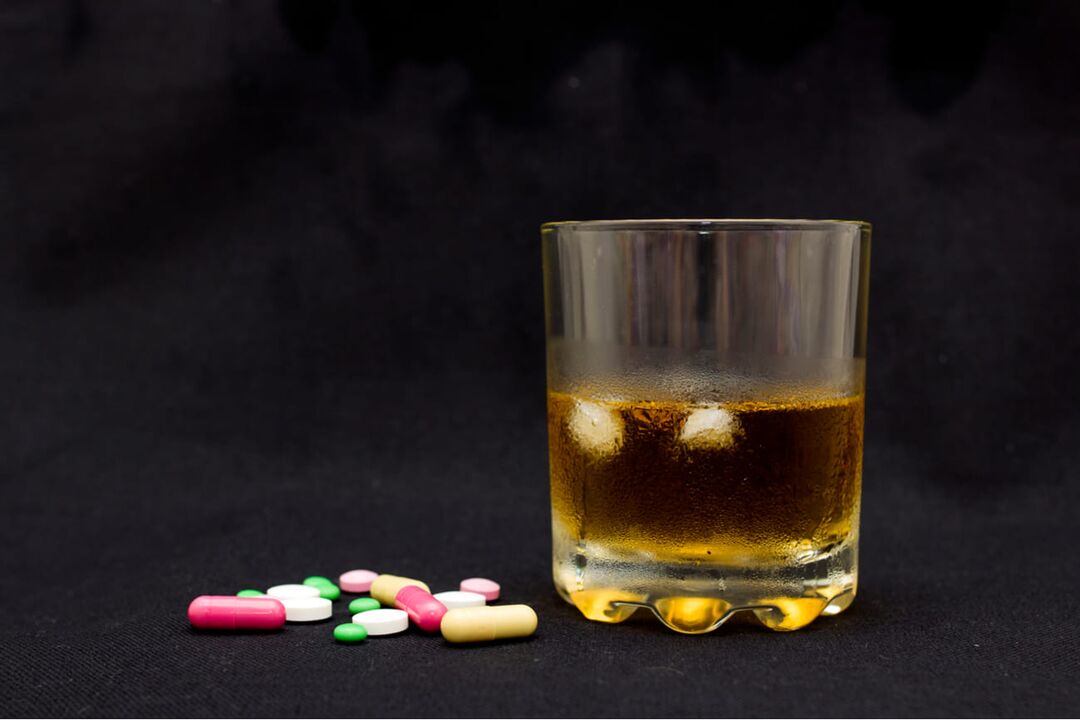
Why you shouldn't take medications with alcohol
- Ethanol at the biochemical level significantly reduces the therapeutic efficacy of antimicrobial agents;
- The combination of alcohol and antibacterial drugs can cause toxic damage to liver cells and other internal organs;
- Drinking alcohol can suppress the immune system and have damaging effects on health, during medicationvery unpopular.
Effects on liver function and condition
Under the action of enzymes, ethanol is decomposed into water and carbon dioxide, but not immediately, bypassing the intermediate stage of forming a highly toxic compound - acetaldehyde, a tissue poison. The faster alcohol breaks down, the less damage it causes to the body. However, in the concurrent presence of antimicrobial drugs in visceral organ tissues, alcohol catabolism is significantly slowed down due to inhibition of the production of alcohol dehydrogenase, which is required to complete the reaction that breaks down ethanol into simple compounds. . .
Ethanol does not interact directly with antibiotics
- This experiment was isolated and not confirmed by other studies, so the safety of the drug and alcohol combination should not be asserted;
- Experimental subjects were given small doses of alcoholic beverages, but moderate consumption of vodka and beer in real life is quite rare;
- These studies only dealt with the interaction of the drug with ethanol; the effect of this combination on the condition of internal organs was not studied, so its negative effects cannot be denied.
Reasons to avoid drinking alcohol during treatment
- If consumed regularly, alcohol can disrupt metabolic processes;
- Ethanol causes an increase in sugar levels in the blood;
- Drinking alcohol causes physical and nervous exhaustion;
- The risk of allergic reactions increases by an order of magnitude.
Each person's internal biological processes have individual characteristics, so the body's response can be predictedalmost impossible, but unlikely to be positive.
Interactions between alcohol and antibacterial drugs
- Nausea with vomiting;
- upset stomach;
- acute headache;
- profuse sweating;
- General weakness and dizziness;
- Tachycardia;
- The pressure increases.
What complications may occur?
Doctors stress that the ban does not only apply to a glass of cognac or vodka. You need to forget about wine, beer, low alcohol drinks. Moreover, ethanol is often found in other foods and medicines, so everyone should pay attention to this aspect.
- Irregularitiesliver function;
- Anaphylactic shock;
- General disturbance of brain and central nervous system functions (severe headache with dizziness, nausea, vomiting, convulsions);
- Gastrointestinal disorders;
- sleep dysfunction;
- hypertension;
- Adverse skin reactions (dermatitis);
- Arrhythmia;
A final word on the alcohol and antibiotic combination debate
Although experts are divided on whether alcoholic beverages and antibacterial drugs can be used together (excluding those with antibacterial effects)The restrictions are clear), most doctors tend to conclude that patients would be better off stopping drinking during treatment.































